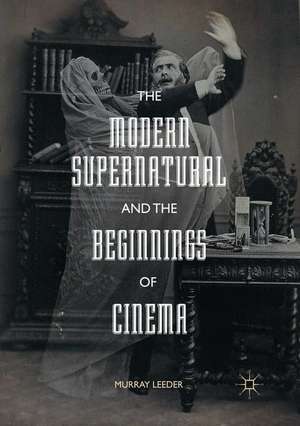The Modern Supernatural and the Beginnings of Cinema
Autor Murray Leederen Limba Engleză Paperback – 5 iul 2019
Preț: 210.70 lei
Nou
Puncte Express: 316
Preț estimativ în valută:
40.33€ • 43.82$ • 33.90£
40.33€ • 43.82$ • 33.90£
Carte tipărită la comandă
Livrare economică 21 aprilie-05 mai
Preluare comenzi: 021 569.72.76
Specificații
ISBN-13: 9781349844562
ISBN-10: 134984456X
Pagini: 209
Ilustrații: XII, 209 p. 21 illus., 1 illus. in color.
Dimensiuni: 148 x 210 mm
Greutate: 0.27 kg
Ediția:Softcover reprint of the original 1st ed. 2017
Editura: Palgrave Macmillan UK
Colecția Palgrave Macmillan
Locul publicării:London, United Kingdom
ISBN-10: 134984456X
Pagini: 209
Ilustrații: XII, 209 p. 21 illus., 1 illus. in color.
Dimensiuni: 148 x 210 mm
Greutate: 0.27 kg
Ediția:Softcover reprint of the original 1st ed. 2017
Editura: Palgrave Macmillan UK
Colecția Palgrave Macmillan
Locul publicării:London, United Kingdom
Cuprins
1.Introduction.- 2. The Haunting of Film Theory.- 3. Light and Lies: Screen Practice and (Super-) Natural Magic.- 4. The Strange Case of George Albert Smith: Mesmerism, Psychical Research and Cinema.- 5. Aesthetics of Co-Registration: Spirit Photography, X-Rays and Cinema.- 6. Méliès’s Skeleton: Gender, Cinema’s Danse Macabre and the Erotics of Bone.- 7. Living Pictures at Will: Projecting Haunted Minds.- 8. Conclusion: Lost Worlds, Ghost Worlds.
Recenzii
“The Modern Supernatural and the Beginnings of Cinema is a cornucopia of ideas, arguments and images both scrupulously well researched and highly readable. This original exploration of film history makes for one of the most pleasurable books I’ve read in 2017.” (Alan Price, The Magonia Blog, pelicanist.blogspot.de, April 05, 2019)
Notă biografică
Murray Leeder teaches Film Studies at the University of Calgary, Canada, and holds a PhD from Carleton University. He is the author of Horror Film: A Critical Introduction (forthcoming) and Halloween (2014) and editor of Cinematic Ghosts: Haunting and Spectrality from Silent Cinema to the Digital Era (2015).
Textul de pe ultima copertă
This study sees the nineteenth century supernatural as a significant context for cinema’s first years. The book takes up the familiar notion of cinema as a “ghostly,” “spectral” or “haunted” medium and asks what made such association possible. Examining the history of the projected image and supernatural displays, psychical research and telepathy, spirit photography and X-rays, the skeletons of the danse macabre and the ghostly spaces of the mind, it uncovers many lost and fascinating connections. The Modern Supernatural and the Beginnings of Cinema locates film’s spectral affinities within a history stretching back to the beginning of screen practice and forward to the digital era. In addition to examining the use of supernatural themes by pioneering filmmakers like Georges Méliès and George Albert Smith, it also engages with the representations of cinema’s ghostly past in Guy Maddin’s recent online project Seances (2016). It is ideal for those interested in the history of cinema, thestudy of the supernatural and the pre-history of the horror film.
Caracteristici
Provides a pre-history to the horror film. Examines the trope of cinema as a haunted or supernatural medium, both as it manifested in cinema's earliest years and its return in recent decades. Ties early cinema to the Victorian cultural phenomena of spiritualism, psychology and stage magic, as well as the emergence of X-ray photography.
